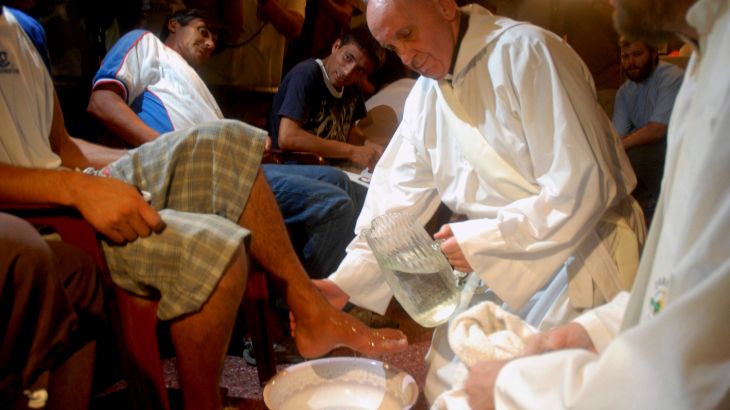
Pope Francis: A symbol of change?
We examine the political, cultural and religious impact of the Latin American pope’s ordination on the region.
He has been praised for his devotion to the poor – a humble man who has lived a modest life.
|
“I think it’s just an exciting choice from the church, for me to hear that somebody has a recent history in pastoral experience, as well as knowledge of and walking with the poor, in addition to speaking out against social economic injustices. – SR Mary Ellen Lacy, a “Nuns on the Bus” particpant |
As the first pope from Latin America, there are hopes that Jorge Mario Bergoglio will re-energise Catholicism in the region, where evangelical christianity has been gaining ground in recent years.
But within minutes of the announcement of his appointment, allegations resurfaced about his role during Argentina’s dirty war.
In a letter last year, Argentine bishops, under the leadership of Cardinal Bergoglio, asked for forgiveness for not doing enough during the dirty war. However, the church’s acknowledgment was preceded by a defence of their actions in the context of the conflict:
“The Argentine homeland has lived difficult and critical moments during its 200 year history. A particular time of disagreement and painful confrontations was the decade of the 1970s. Many years have passed and there continue to emerge unanswered questions about the events that occurred and the responsibility that people and insitutitons had. To return to those events, it is necesary to take into account the socio-political context of the times and the many actors who intervened.”
Despite his reputation as an advocate for the poor, Pope Francis has long been a critic of Liberation Theology, the school of thought born in Latin America among Catholic priests, that said the church must take an active political role in lifting people out of poverty and fighting injustice.
His selection comes at a particularly interesting time as the Vatican’s role in social justice movements is being actively debated, both in the United States and Latin America.
So, what will be the political, cultural and religious impact of Pope Francis’ ordination on the region? And what was his role in the country’s dirty war?
Joining Inside Story Americas, with presenter Shihab Rattansi, are guests: Ivan Petrella, an Argentine social theorist; Miguel de la Torre, a religion professor at the Iliff School of Theology; and Sister Mary Ellen Lacy one of the “Nuns on the Bus” who travelled across the US during the presidential election campaign to promote social justice and protest against cuts in programmes for the poor.
|
“I think those allegations quite frankly are untrue … I am in Buenos Aires right now, so I had been in the middle of all this, hearing the allegations back and forth, and I think it is very important to note that Adolfo Perez Esquivel who is an Argentine Nobel peace prize winner for 1980 – that’s in the midst of the Argentine dictatorship – he wins a Nobel peace prize for the struggle against the dictatorship and in favour of human rights, has yesterday and today come out to claim openly that Bergoglio, the current pope, had no links to the dictatorship. Now, what is true, is that the Argentine Catholic Church rarely spoke out directly against the dictatorship.” – Ivan Petrella, an Argentine social theorist |